Distinctive features and characteristics of bathtubs made of different materials

Long gone are the days when the bathtub was a knobby container resembling a large basin. Today bathtubs are made of acrylic, cast iron, artificial stone, steel, and plastic. Each product is characterized by its own advantages and disadvantages, which are due to the material of manufacture and production characteristics. Let's take a closer look at each of them.






Peculiarities
Perhaps everyone knows what a bath is. This is a bowl into which water is collected for further hygiene procedures.
Regardless of the material of manufacture and features of size and shape, the bath must meet the following requirements:
- environmental friendliness (when filling it with hot water, no life-threatening vapors should be released);
- moisture resistance (the bath material should not be hygroscopic);
- safety (high antibacterial indicators are required, the presence of a non-slip day);
- compatibility with standard sewerage and plumbing systems;
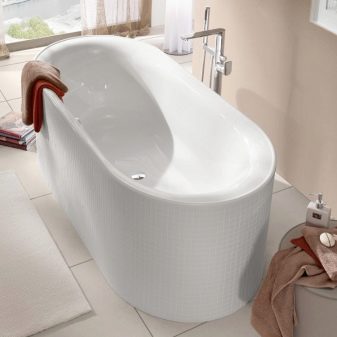

- strength, ability to withstand heavy weight;
- durability.
Types and characteristics
Usually, speaking about the variety of baths, first of all, they mean their differences in terms of the material of manufacture.

Acrylic
Today, most city apartments have an acrylic bathtub. It is based on an acrylate polymer. It can be in the form of sheet material or be extruded. The first option is preferable, since a bath made of a solid acrylic sheet is more durable and, accordingly, a longer service life.
Acrylic itself is a fragile material, so the finished product is reinforced with fiberglass. Thus, the strength is determined by the thickness of the walls of the bath (ideally at least 5-6 cm) and the quality of the reinforcing layer.

An acrylic bathtub has the following advantages:
- fairly good strength indicators;
- long period of operation, when it comes to acrylic sheet fonts (service life is 10-12 years);
- light weight (a standard bathtub 150 cm long and 70-75 cm wide weighs on average 25-30 kg);
- good thermal insulation performance (water in such a bath cools down slowly - by 1 ° C for half an hour);
- a high coefficient of sound insulation (unlike metal baths, an acrylic hot tub does not rattle when water is collected);
- the material is pleasant to the touch - warm, smooth;
- a variety of shapes and sizes due to the plasticity of raw materials and the peculiarities of production processes.


Among the obvious disadvantages, it is worth highlighting:
- susceptibility to deformations and vibrations, therefore, if you want to equip an acrylic bowl with a hydromassage system, you should choose a thick-walled product;
- fragility of the top layer - it is easily damaged by careless handling;
- it is possible that the white acrylic bathtub may turn yellow during operation (however, this can be corrected by using the restoration service).

The acrylic surface is sensitive to strong cleaning agents and abrasives. If you compare the cost of an acrylic bowl with the price of a cast-iron option, for example, it turns out that it is lower. At the same time, bowls made of sheet acrylic are 2-3 times more expensive than the cost of an extruded analogue.
However, the higher price is due to the ease of use and durability of the first option.The extruded bath will not last even 5 years, and in the process of operation it will lose its attractive appearance.

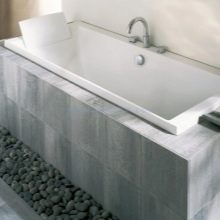

Cast iron
Another popular bath option is cast iron. This metal is characterized by high thermal conductivity. It heats up slowly, but it also gives off heat for a long time.
The cast iron bath contains iron oxides, which causes its large weight... In rare cases, it is less than 80 kg (as a rule, these are small sitz baths). If we talk about large bowls, then their weight can reach 150-180 kg and even more when it comes to custom-made models.
The considerable weight of the structure determines not only the complexity of transportation and installation of the structure, but also the compliance of the strength of the foundation with certain indicators. So, a cast-iron bath is not recommended for installation in buildings with dilapidated or wooden floors without first strengthening the base.


The maximum permissible foundation load in this type of building is usually 230-250 kg. A medium sized bathtub weighs 100-120 kg. If we add to this indicator the weight of water (approximately 50 kg) and the weight of the user (at least 50-60 kg), it turns out that the bathtub presses on ceilings weighing 200 kg or more. This is unsafe for decrepit floors.
The weight of a cast iron bath depends on its dimensions (height, width and depth), wall thickness, and the availability of additional equipment. However, the heavy weight of the structure is not always a disadvantage. It also contributes to the reliability and stability of the bath, its walls do not vibrate or deform. This is why the cast iron bowl is well suited for installing hydromassage equipment in it.



The robustness and practicality of the bath also means a long service life. The manufacturer usually gives a guarantee for its products for 30-40 years, however, user reviews indicate that such a bathtub can last 2-3 times longer without requiring repairs.
The cast iron bath has a smooth enamelled surface. However, it is cold, therefore, before stepping into the bowl, it is advisable to drain the water and warm up the bath. The difference between the thermal efficiency of acrylic and cast iron baths is small. If in the first water it cools down by 1 ° С every 30 minutes, then in cast iron - every 15-20 minutes. The price of a high-quality cast-iron bath is quite high, however, this drawback is paid off by its high technical characteristics and a long service life.
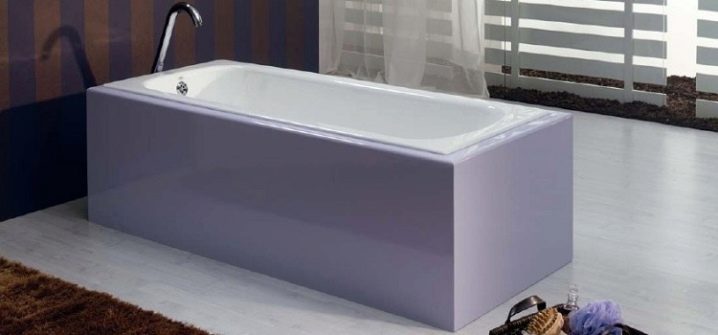
Steel
A type of metal bath is a steel bowl. It differs from cast iron in lighter weight (the weight of a steel bath is similar to that of an acrylic bath and is 30-50 kg). However, the low weight causes the bath to become unstable and is fraught with tipping over if the fixation is insufficient. The service life of the product is up to 15 years. The disadvantage is the low rates of heat and sound insulation.


Stone
Stone bathtubs are distinguished by high indicators of strength and a long service life. They mean bowls made of marble or other chips made of natural stone and polyester resins. The crumb makes up at least 80% of the composition, which determines the strength of the product, and polyester resins and plasticizers ensure the smoothness of the surface, its high moisture-strength characteristics.
Artificial stone products are lighter than their counterparts from a natural mineral. The technology of their production is simpler, and therefore baths made of artificial stone are cheaper compared to models made of natural material. Comparing the cost of a bowl made of marble casting (chips) with the prices of acrylic and cast iron baths shows that the first option is much more expensive.



Artificial stone baths have the following advantages:
- lack of background radiation, which cannot be said about natural stone fonts;
- attractive appearance - high-quality imitation of material for a product made of natural stone;
- pleasant to the touch surface of the bowl - smooth, warm;
- the ability to self-cleaning and high antibacterial characteristics due to the absence of pores on the surface of the product;
- high strength, which is 2 times higher than that of a bowl made of natural marble;
- resistance to deformation, vibration;
- long service life - up to 40-50 years.


Plastic
Within the framework of this article, it is worth mentioning the plastic bowls. They are lightweight and inexpensive, but not suitable for regular use. Plastic hot tubs do not have a large margin of safety, are prone to deformation, do not withstand high temperatures and mechanical stress.
They can only be operated in heated rooms several times per season (which is why they are sometimes installed in summer cottages).
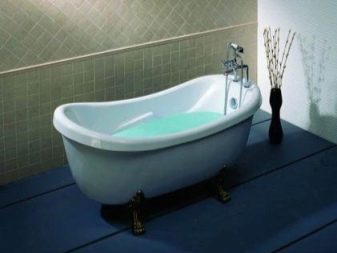

Which one to choose?
The analysis of each of the models according to certain criteria will help to choose the optimal bowl. So, let's decide which of the fonts will give maximum comfort in terms of maintaining the temperature of the water and ease of use of the bath.
- Acrylic and cast iron bathtubs are almost equally good at maintaining water temperatures. The stone one is also not inferior in this performance, but the steel structure cools down quickly enough.
- It is also important how quickly the bath itself heats up. When using cast iron and steel, the user is forced to step into a cold bowl or drain the water beforehand to warm it up. When using acrylic and stone fonts, such problems do not arise.


- When bathing, it is important that the bowl does not sag under the weight of the water and the user. The walls of a cast iron and stone bathtub do not bend under any conditions. Acrylic is prone to deformation. Tips on how to prevent this nuisance come down to one thing - choose products with thick walls, and also use a special frame under the bowl. Steel tubs do not bend under heavy weight.
Thus, cast iron and stone bathtubs are primarily suitable for comfortable use, the next position is occupied by acrylic bowls, and in the “last” place are steel ones.


- However, fonts made of stone and cast iron are of considerable weight, therefore they are not installed in bathrooms with dilapidated ceilings. The heaviest are cast iron products, the weight of which can reach 150 kg. This leads to the emergence of additional costs for transportation and installation of the device. Products of European brands are 15-20 kg cheaper than analogues of a domestic manufacturer.
- Cast marble baths are somewhat inferior to cast iron ones, their weight can reach 80-90 kg. The steel bath weighs 25-30 kg, and the acrylic bath weighs 15-20 kg. The indicated figures are approximate, the weight depends on the dimensions of the bowl and the thickness of the walls.
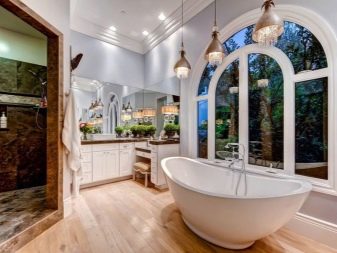

Thus, if you are looking for a lightweight but strong and durable bowl, an acrylic bowl is better.
- An important criterion is the cost of the product. The most affordable are steel structures. The price for a standard bath starts at $ 50. The cost of acrylic products of a domestic manufacturer starts from 600-100 dollars, European ones - from 130-200 dollars.
- If we talk about devices equipped with a hydromassage system, silicone head rests or handles, then the price starts at $ 450.
- The minimum price for cast iron baths is $ 65-70. A similar figure is called when mentioning the cost of stone products. Products from European brands cost between $ 200 and $ 450.


Summing up, we can say that the most affordable are steel bathtubs. However, they are inferior to other models in terms of technical characteristics (they do not retain heat, are unstable, etc.), therefore they are rarely purchased. Acrylic products demonstrate the best value for money.
If funds permit, cast iron and stone models are usually recommended, the advantages of which are in their thermal efficiency, reliability, and absence of deformations.

Cost and specifications are usually the first purchase criteria.
However, a bowl of a certain size or design is often required.
- The greatest variety of shapes and colors can be found in the assortment of acrylic bathtubs. Due to the peculiarities of production and plasticity of the material, the bowls can be given almost any shape. However, the more complex it is, the less quality the reinforcement is. The use of a metal frame, which must be installed under an asymmetric acrylic bowl, will prevent deformation.
- Cast iron is not very flexible, so the bowls do not have a wide variety of shapes. However, the most popular (rectangular, oval, trapezoidal and simple asymmetric shapes) among the range of cast-iron bathtubs will not be difficult to find.



- Stone products also have many types of shapes, but the original models are characterized by a higher cost. This is due to the fact that the raw materials are poured into the formwork of a certain shape. The manufacture of formwork (molds for a bowl) of an unusual type involves an increase in financial costs, which is reflected in the final cost of the product.
- Corner bowls are very popular due to their ergonomics. Each of the considered baths can have an angular solution. Corner fonts are equally and versatile.
Thus, if you dream of a bathroom with an unusual shape, it will definitely be acrylic. If the means and the quality of the floors in the house allow - a bathtub made of cast marble.
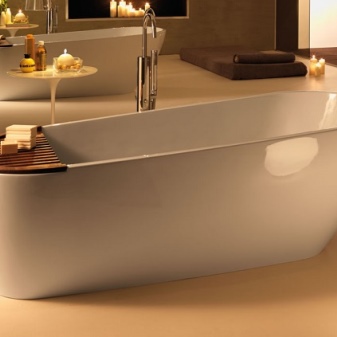

As a rule, a new bathtub made of any material is attractive. Over time, cracks, scuffs and stains appear on it, some coatings are more susceptible to their appearance.
Let's figure out which bath will retain its original appearance longer than others and will not require much effort and care.
- The most protected is the cast-iron bathtub, which has an enamel coating. It is not afraid of active cleaning, temperature changes, and does not turn yellow over time. A similar enamel is applied to the surface of steel bowls, but in a thinner layer. This becomes the reason that in terms of the quality of the coating, steel bowls are inferior to cast iron.
- Stone and acrylic bowls are considered the most capricious. They are easy to paint, snow-white acrylic products lose color over time. In addition, they are very fragile - they easily crack under mechanical stress. Stone and acrylic bowls must not be washed with abrasive products or hard sponges.


- The selection criterion is the ease of installation of the bowl. It is practically impossible to lift a cast-iron bath and install it alone. Even with helpers, this process is challenging.
- A bowl made of artificial stone is also characterized by a large weight, therefore, when installing it, the same difficulties arise as when installing a cast iron product.
- Acrylic construction, especially when it comes to an asymmetric model, requires the assembly of a metal stand under the bowl. Usually it is not difficult to assemble it, although it takes time and effort.
- Steel bathtubs are distinguished by the most simple installation - one person can handle it. Installation of such a bowl is carried out on the legs. However, steel baths are cold; to increase their thermal insulation properties, they resort to pasting the bottom with Penofol or spraying polyurethane foam on it.


- By purchasing a bathtub, buyers hope for a long product life. The leading position in this respect is occupied by bowls made of cast iron and stone, the service life of which is 50 years (often more). Steel products demonstrate 2 times less durability. The smallest is acrylic bathtubs. Provided that it is based on sheet acrylic with a thickness of at least 5 mm, it serves for 15 years.
Having carried out such a detailed analysis, we can say that acrylic fonts find the optimal ratio of decent quality and affordability. Unsurprisingly, they account for the bulk of sales.

Famous manufacturers
Baths of European manufacturers (if we are talking about original products) are a priori of high quality, durable and safe.
- Brands like Roca (Italy), Villeroy & Boch (Germany), Riho (Holland), Jacob Delafon (France) produce a variety of models of acrylic, cast iron and stone bowls. Their products are high quality, meeting European quality and safety requirements. A distinctive feature is a wide price range: from fairly economical to premium models. However, even the most modest products from any of these manufacturers are quite expensive for the average buyer.




- A relatively recent Austrian brand deserves attention. Alpen... The acrylic bathtubs produced by him are not inferior in quality to other European models, but they are cheaper.
Modern domestic manufacturers can also boast of decent product quality. Especially when it comes to joint Russian-European production. The only thing: usually, products of domestic brands do not have such an exquisite appearance as imported counterparts.

- The products of the companies enjoy the trust of buyers "Triton", "Aquanet", "Universal"... A feature of their products is that they are targeted at the Russian buyer. In addition to standard designs, in the collections of these brands you can find bathtubs of unusual shapes and reduced sizes, designed for small bathrooms.
Of course, baths of standard sizes are the most common., the length of which is 150-160 cm, the width is from 70 to 80 cm. In such a bath, an adult can sit reclining, the bowl itself fits even in the "Khrushchev" bathrooms. It is not surprising that the model "Nostalgie" with a bowl size of 150x70 cm from the "Universal" company is a real "hit" both in the Internet and in ordinary stores.

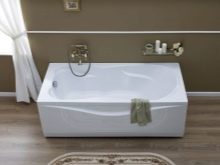
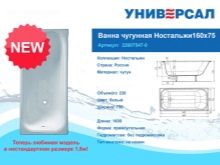
Russian manufacturer "Triton" produces a large number of asymmetric acrylic bathtubs with high-quality reinforcement. There are left- and right-sided bowls. All of them are equipped with a wide side shelf, on which it is so convenient to place bath accessories and bathroom accessories, for example, from the Fora company.
The best manufacturers and suppliers of cast iron bathtubs are by Leroy Merlin (baths of our own production and other brands, from budget to more expensive), Jacob Delafon (snow-white and colored, rectangular and oval cast iron bathtubs in different price ranges), Roca (a collection of cast iron products is small, mostly oval), Elegansa (overall premium bowls).


Reviews of experts
Experts give good feedback on acrylic baths made of sheet metal, the thickness of which is at least 5 mm (ideally 6-8 mm). When choosing (regardless of the material of manufacture), you should pay attention to the surface of the product. It should not have any damage (scratches, chips), noticeable pores and uneven coloration.
It is important to understand that any damage to the surface of the bathtub is not just a cosmetic defect. Even a small scratch causes a decrease in the moisture resistance of the coating, this leads to an increase in the number of cracks and the absorption of dirt in the area of the damaged area (hence its dark shade).



If the choice fell on a whirlpool bath, immediately purchase a multi-level water purifier, as well as water softeners. This will prevent "clogging" of the nozzles with scale and deposits, which are caused by insufficient purity and softness of water in most regions of the country.
Ravak acrylic bathtubs are highly appreciated by specialists.made of injection molded acrylic. The reverse side of the products is covered with chopped fiberglass, sometimes with epoxy resin. In the finished product, the wall thickness is 5-6 ml, it is important that most of the composition is acrylic. According to experts, the PollSpa brand (Poland) is characterized by the high quality of acrylic.There is only one drawback of these models - high cost.


Good reviews are getting bowls of brands Balteko (Baltic) and Aquatika (Russia), if you are smart about choosing and analyzing the quality of products, you will be able to find a worthy option.
It is worth refraining from buying "sandwich" bathtubs, in which ABC (a type of plastic) acts as a base, and a thin layer of acrylic is applied on top of it. Similar products are marketed under the brand names Appollo (China), Bellrado and Bas (Russia)... The models do not differ in a large wall thickness, and, therefore, in strength. For some manufacturers, white tubs turn yellow quickly.


For information on how to choose the right bath, see the next video from the Kashirsky Dvor shopping center.













The comment was sent successfully.